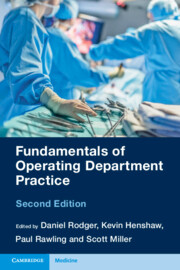Book contents
- Fundamentals of Operating Department Practice
- Fundamentals of Operating Department Practice
- Copyright page
- Contents
- Contributors
- Foreword
- Chapter 1 The Caring Perioperative Practitioner
- Chapter 2 Evidence-Based Operating Department Practice
- Chapter 3 Healthcare Ethics and Professional Regulation in Operating Department Practice
- Chapter 4 Operating Department Practice and the Law
- Chapter 5 Health and Safety in the Perioperative Environment
- Chapter 6 Fundamentals of Operating Department Design
- Chapter 7 Fundamentals of Infection Prevention and Control in the Operating Department
- Chapter 8 Fundamentals of Cardiovascular Physiology
- Chapter 9 Recognition and Interpretation of the Electrocardiogram
- Chapter 10 Fundamentals of Respiratory Physiology
- Chapter 11 Introduction to General Anaesthesia
- Chapter 12 Fundamentals of Airway Management
- Chapter 13 Artificial Ventilation
- Chapter 14 Management of Perioperative Medical Emergencies
- Chapter 15 Total Intravenous Anaesthesia
- Chapter 16 Fundamentals of Basic Patient Monitoring
- Chapter 17 Haemodynamic Monitoring
- Chapter 18 Fundamentals of Regional Anaesthesia
- Chapter 19 Fundamentals of the Anaesthetic Machine
- Chapter 20 Anaesthetic Breathing Systems
- Chapter 21 Pharmacological Agents in Anaesthetic Practice
- Chapter 22 Fundamentals of Emergency Obstetric Care
- Chapter 23 Care of the Bariatric Patient
- Chapter 24 Fundamentals of Decontamination and Sterilisation
- Chapter 25 Management and Use of Medical Equipment
- Chapter 26 Fundamentals of the Surgical Scrub Role
- Chapter 27 Fundamentals of Patient Positioning for Surgery
- Chapter 28 Fundamentals of Perioperative Thermoregulation
- Chapter 29 Fundamentals of Fluid and Electrolyte Balance during Surgery
- Chapter 30 The Physiology of Blood and Its Administration
- Chapter 31 Fundamentals of Wound Healing, Dressings, and Drains
- Chapter 32 Understanding Sutures and Skin Closure
- Chapter 33 Perioperative Care of the Paediatric Patient
- Chapter 34 Perioperative Pain Management
- Chapter 35 Recovery of Patients from Anaesthesia and Surgery
- Chapter 36 The Fundamentals of Emergency Resuscitation
- Chapter 37 Human Factors, Ergonomics, and Non-technical Skills
- Chapter 38 Understanding Intraoperative Death
- Chapter 39 Extended and Advanced Roles in Perioperative Practice
- Index
- References
Chapter 36 - The Fundamentals of Emergency Resuscitation
Published online by Cambridge University Press: 18 August 2022
- Fundamentals of Operating Department Practice
- Fundamentals of Operating Department Practice
- Copyright page
- Contents
- Contributors
- Foreword
- Chapter 1 The Caring Perioperative Practitioner
- Chapter 2 Evidence-Based Operating Department Practice
- Chapter 3 Healthcare Ethics and Professional Regulation in Operating Department Practice
- Chapter 4 Operating Department Practice and the Law
- Chapter 5 Health and Safety in the Perioperative Environment
- Chapter 6 Fundamentals of Operating Department Design
- Chapter 7 Fundamentals of Infection Prevention and Control in the Operating Department
- Chapter 8 Fundamentals of Cardiovascular Physiology
- Chapter 9 Recognition and Interpretation of the Electrocardiogram
- Chapter 10 Fundamentals of Respiratory Physiology
- Chapter 11 Introduction to General Anaesthesia
- Chapter 12 Fundamentals of Airway Management
- Chapter 13 Artificial Ventilation
- Chapter 14 Management of Perioperative Medical Emergencies
- Chapter 15 Total Intravenous Anaesthesia
- Chapter 16 Fundamentals of Basic Patient Monitoring
- Chapter 17 Haemodynamic Monitoring
- Chapter 18 Fundamentals of Regional Anaesthesia
- Chapter 19 Fundamentals of the Anaesthetic Machine
- Chapter 20 Anaesthetic Breathing Systems
- Chapter 21 Pharmacological Agents in Anaesthetic Practice
- Chapter 22 Fundamentals of Emergency Obstetric Care
- Chapter 23 Care of the Bariatric Patient
- Chapter 24 Fundamentals of Decontamination and Sterilisation
- Chapter 25 Management and Use of Medical Equipment
- Chapter 26 Fundamentals of the Surgical Scrub Role
- Chapter 27 Fundamentals of Patient Positioning for Surgery
- Chapter 28 Fundamentals of Perioperative Thermoregulation
- Chapter 29 Fundamentals of Fluid and Electrolyte Balance during Surgery
- Chapter 30 The Physiology of Blood and Its Administration
- Chapter 31 Fundamentals of Wound Healing, Dressings, and Drains
- Chapter 32 Understanding Sutures and Skin Closure
- Chapter 33 Perioperative Care of the Paediatric Patient
- Chapter 34 Perioperative Pain Management
- Chapter 35 Recovery of Patients from Anaesthesia and Surgery
- Chapter 36 The Fundamentals of Emergency Resuscitation
- Chapter 37 Human Factors, Ergonomics, and Non-technical Skills
- Chapter 38 Understanding Intraoperative Death
- Chapter 39 Extended and Advanced Roles in Perioperative Practice
- Index
- References
Summary
This chapter explains the fundamental elements of resuscitation. Patients in cardiorespiratory arrest require prompt and effective resuscitation to improve chances of a good outcome. Identification of the underlying cardiac rhythm and treatment of any reversible causes is critical to achieve patient survival. A structured ABCDE approach and the ALS algorithm are commonly adopted to optimise patient assessment and management. An awareness of both technical and non-technical skills are important when dealing with the acutely deteriorating patient.
Keywords
Information
- Type
- Chapter
- Information
- Fundamentals of Operating Department Practice , pp. 407 - 421Publisher: Cambridge University PressPrint publication year: 2022
